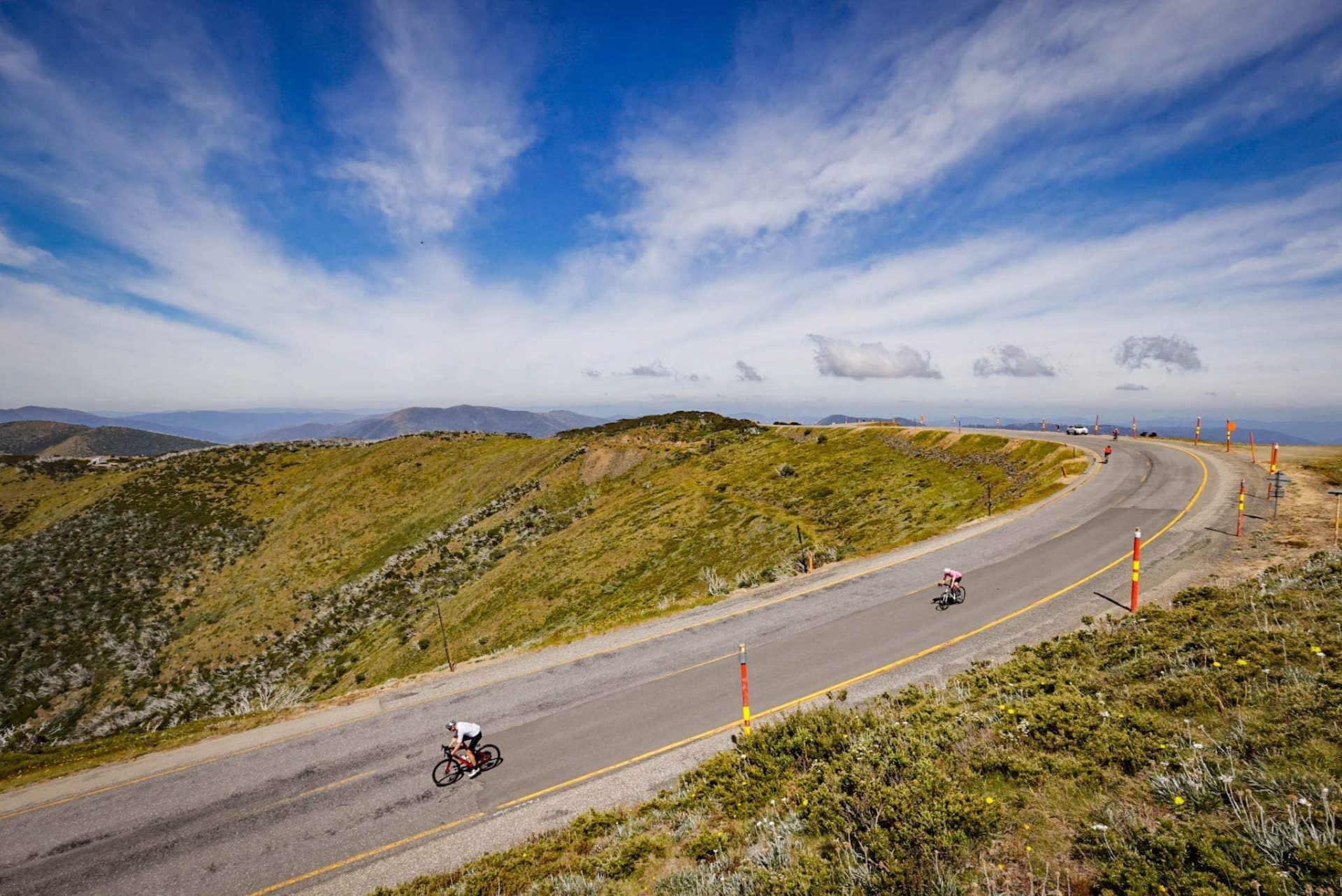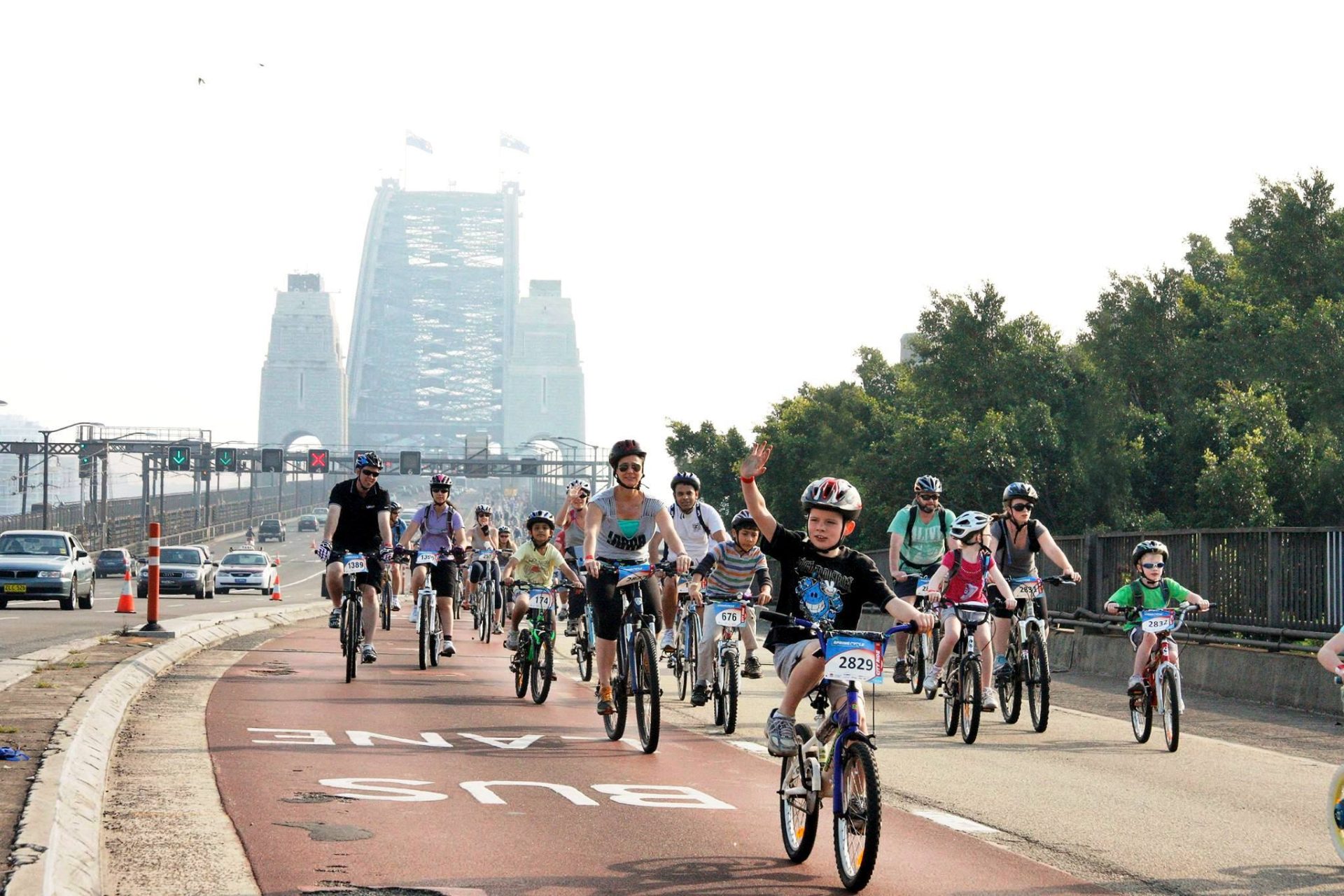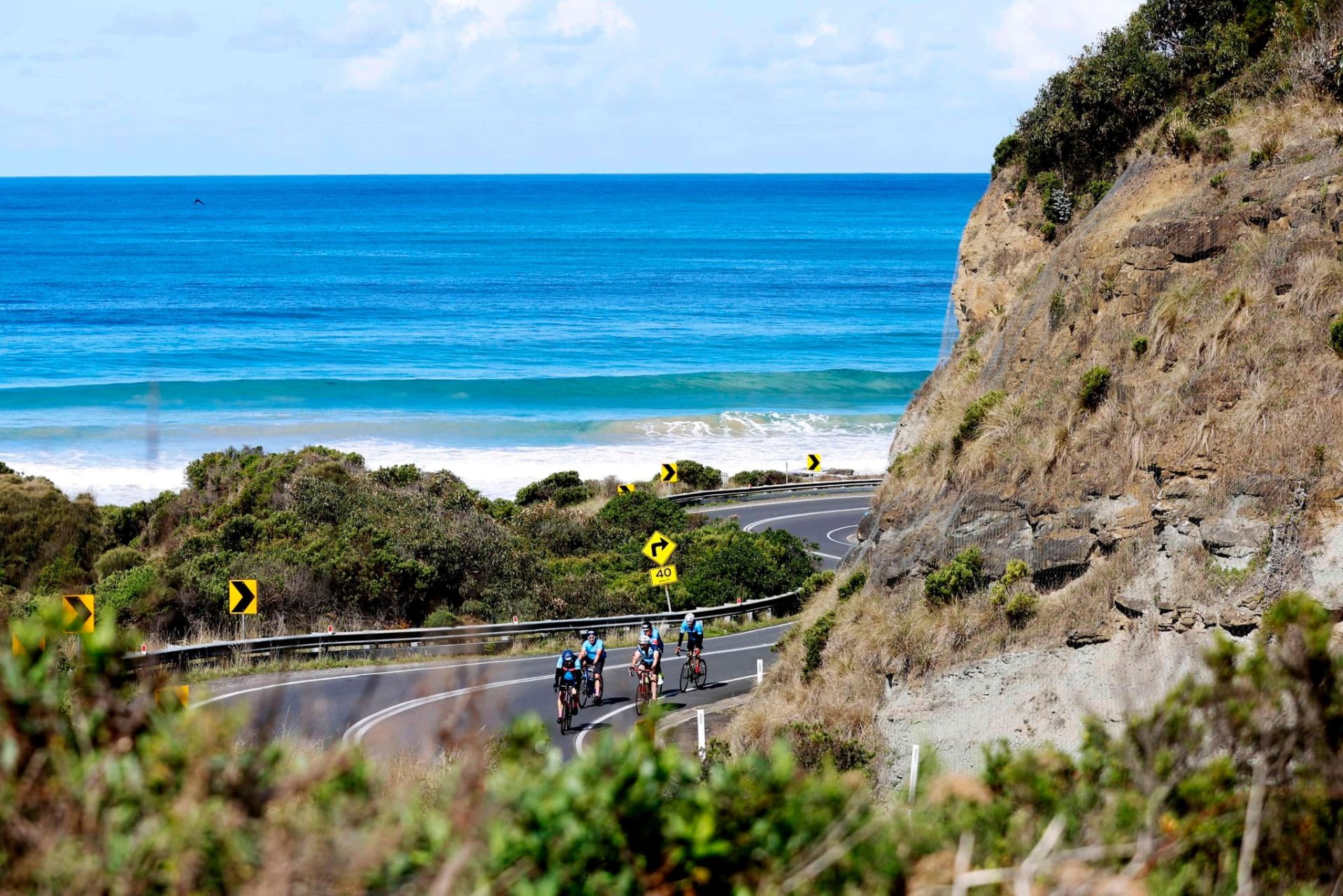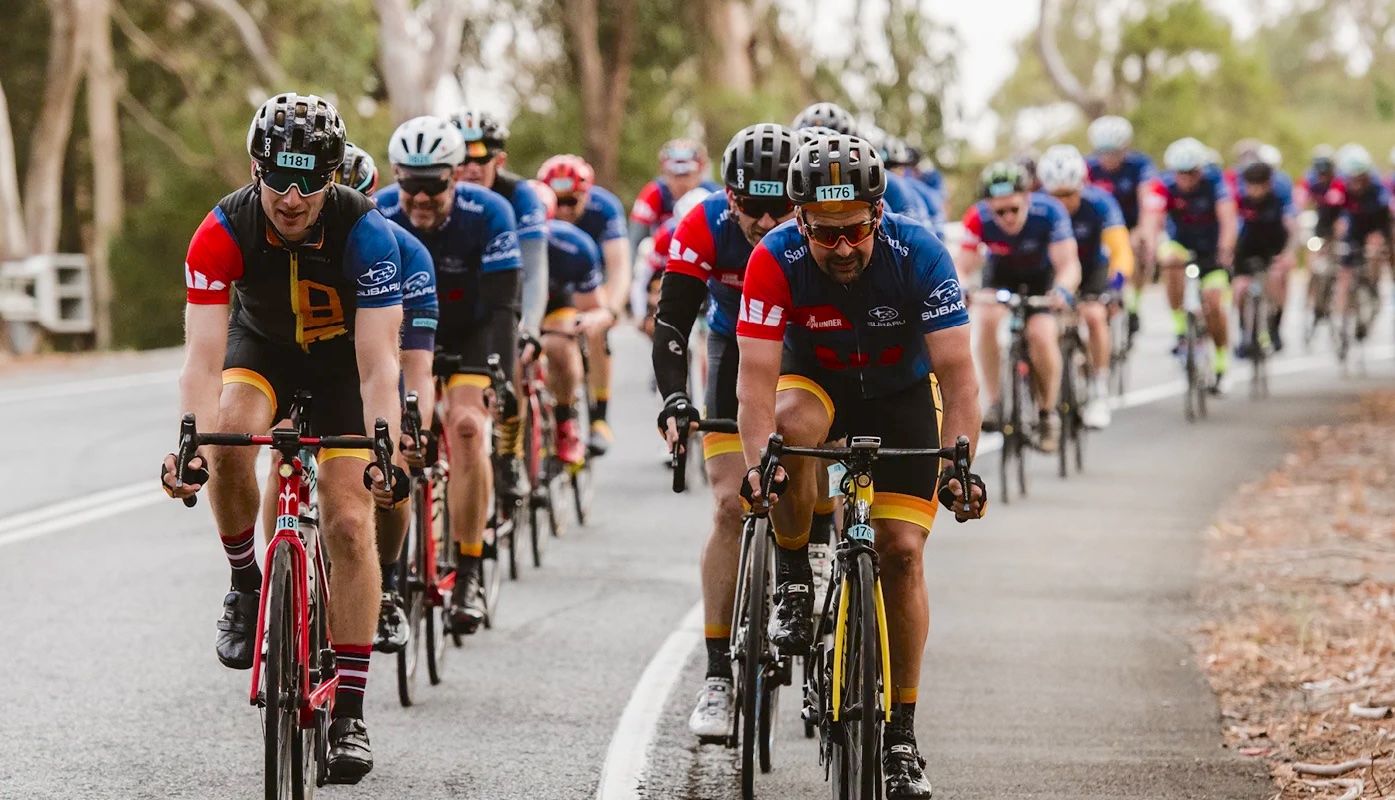If you’re an Australian road cyclist, there’s a good chance your journey through the sport has involved some number of mass-participation events. Maybe rides like Around the Bay in a Day (VIC), Spring Cycle (NSW), or the People’s Ride at the Tour Down Under (SA) were early challenges during your time as a cyclist, or maybe they continue to be a focal point for your riding every year. Regardless, events like these have long allowed riders of a range of abilities to challenge themselves while riding with their mates, and often in iconic locations.
Now, though, there are worrying signs for the Australian gran fondo scene. At least five of the biggest mass-participation cycling events in the country have been cancelled for the upcoming Australian spring and summer. It’s a worrying trend that has some questioning what the future holds for Aussie challenge rides.
One of the highest-profile casualties is the Tour Down Under Challenge Tour. Held since 2003, this event afforded amateur riders the chance to ride the route of a men’s Tour Down Under stage just hours before the pros came through.
When race organisers revealed their community rides schedule for the 2024 TDU last week, the Challenge Tour was a notable omission.
“Unfortunately due to heightened costs of delivery and other complexities including risk and safety, paired with reduced registration numbers over the past number of years, this decision [to cancel the Challenge Tour] was made for our 2024 event,” organisers said via Facebook.
Organisers have said they’ll consider bringing the event back in future, but for now they’re focusing on other community events, such as smaller group rides, a Carpark Climb, and a time trial in which amateur riders will battle Richie Porte up Willunga Hill.

Over in the Victorian Alps, one of the country’s toughest challenge rides – the Alpine Classic – has run into similar difficulty.
Based in the holiday town of Bright, the Alpine Classic featured a multitude of route options, not least the ‘320 km Ultimate’ which featured 6,600 metres of climbing over four of the country’s biggest mountain ascents. But after the Alpine Classic was heavily disrupted for the past four years – due to bushfires, COVID, extreme heat, and a landslide – the January 2024 edition has been cancelled.
“In the post-pandemic world, rising inflation has increased costs, and the general tourism boom in Bright has made it increasingly difficult for riders to find accommodation during the event weekend,” organisers O2 Events said in an email to participants. “The management team sadly concludes that running the 2024 Alpine Classic is not feasible, with no future date set for the event.”
Speaking to Escape Collective this week, O2 Events operations manager Blake Carpinteri reiterated that the increased popularity of start-finish town Bright has been a big factor. With more people moving to Bright to live, fewer AirBNBs are now available for riders to stay in, ultimately driving up prices. The Alpine Shire Council has also pushed the event away from its traditional start/finish location of Howitt Park, leaving few suitable alternatives in the area.
Carpinteri said that while it’s possible the Alpine Classic could return as a smaller event in future, run by the Audax Cycling Club and its volunteers as it once was, it’s unlikely the event will run again in its current form. “In our history, when an event starts to reschedule, or change, or bits of doubt [are] cast upon participants, there’s sort of no way back from it,” he said.

Over in the ACT, another climb-heavy event has also fallen by the wayside, at least temporarily. Fitz’s Challenge has been running since 1989 and it too has several tough route options, including the 255 km ‘Fitz’s Extreme’ with 5,000 metres of climbing. Due to be held in late October, the 2023 edition was called off earlier in the year.
“Like many cycling events around the country, over the past years Fitz’s Challenge has faced some significant difficulties, including the impact of COVID-19 and the rise of other cycling events on the national calendar,” organisers wrote in May. “Also, participant numbers have dropped, costs have increased and [fewer] volunteers have been available. All of this has been making it difficult to run such a large event.”
Organisers are hopeful Fitz’s Challenge will return.
Up in Queensland, the Noosa Classic is also in strife. Ridden over three distances – including the 160 km Maxi Classic which tackles 2,000 m of climbing on the “relentless undulations of the stunning hinterland” – the 2023 Noosa Classic was meant to run last month but was cancelled back in May following the removal of government funding.
“This tough decision is due to a number of factors including rising associated local costs and an insufficient level of financial support from local and state government stakeholders,” organisers wrote at the time.
Down in Sydney, Spring Cycle is another event that won’t run this spring. Billed as “the only ride that goes over the Sydney Harbour Bridge, along the Cahill Expressway, and through the CBD on closed car free roads”, Spring Cycle offered both a 10 km and 50 km version. It was due to run in early October but that has now been called off, for reasons that will now be familiar.
“Due to the rising event costs and declining events sponsorship revenue, we have had to make the very difficult and challenging decision to cancel this year’s 2023 Spring Cycle event,” organisers wrote.

So what’s going on here? Why are so many events falling over? There are a bunch of factors, but as you’ve probably already worked out, it mostly comes down to money.
As inflation continues to rise in Australia, so the cost of putting on big events has increased. As Blake Carpinteri from O2 Events said of Alpine Classic, “pretty much every line item in our budget has gone up over the last few years. So getting anything from the fencing … to the toilets, to the road barriers, everything is going up.”
At the same time, governments seem to have less money to throw at grassroots cycling events, and the same is true of would-be sponsors. Reductions to these contributions directly impact an organiser’s ability to break even, let alone make a profit. And then there’s the not-insignificant issue of participant numbers.
The increasing cost of living seems to be impacting rider numbers at most if not all events, with more people unable to afford the (ever-increasing) cost of attending such events. There’s also a sense from organisers that the events space is still recovering from the COVID years that saw rides like these cancelled. Getting people to sign back up in the post-COVID era has proven tricky.
Case in point: the Alpine Classic. O2 Events never received such a positive outpouring of support for the event as when it announced it was cancelling the 2024 edition. And yet when Carpinteri and his colleagues dug into the details of those who’d been in touch, what they found spoke volumes.
“Most of them hadn’t registered in the last five years,” he said. “Yeah, they all loved it and they want it to stick around, but they weren’t supporting the event. They weren’t riding anymore for whatever their own reasons are.”

Alison McCormack is the CEO of Bicycle Network, the not-for-profit advocacy organisation that also runs Around the Bay in a Day (VIC), Peaks Challenge Falls Creek (VIC), the Newcrest Orange Challenge (NSW), and other similar events. She told Escape Collective that Bicycle Network is experiencing the same as what Carpinteri is reporting – that people just haven’t come back to their events in the same numbers as pre-COVID.
In trying to understand that trend, the organisation did some surveys to find out what would bring people back to Around the Bay.
“The number one thing for everybody was, ‘We want a closed lane along the [Melbourne to Geelong] freeway, and we will be back,’” McCormack said. “And so we did it, at a hefty expense as well.”
And yet, it seemed to make little if any difference. Sign-ups for the 2023 Around the Bay are still well down on where they once were.
“We’ve got three weeks to go to Around the Bay and presently we’re not breaking even – we’re going to lose money,” McCormack said.
In fact, things are pretty dire when it comes to Bicycle Network’s events in general.
“We lost $1.2 million on events last year, and a not-for-profit organisation cannot sustain that,” she said. “So we’ll have to do something about it.
“Events are in jeopardy. I really believe it. I think that without people coming back, they’re really not turning a dollar. And there’s increased costs as well involved in events like traffic management.”
McCormack urges anyone who’s thinking about taking part in Around the Bay (or the organisation’s other events, for that matter) to go ahead and sign up, to ensure they can continue into the future.
“We need you to support this event,” she said. “Otherwise, quite frankly, it won’t be around. Which is a real shame because so many people started on Around the Bay.”
The same goes for Bicycle Network’s venerable multi-day challenge ride, the ‘Great Vic’. Scheduled for late November and early December, this too is in difficulty and at risk of being cancelled next year if sign-ups don’t improve.

Bicycle Network’s president, James Garriock (an Escape Collective member) shares McCormack’s pessimism about the future of mass-participation cycling events.
“My perspective is that we are looking at what the post-COVID world is actually going to be like,” he said. “We lost the joy of doing things together during COVID. Will we ever get it back? Even if we rediscover that joy, will there be any events left to do, or will that chapter have closed?
“It’s not just the next Sarah Gigante or Simon Clarke that I’m talking about. It’s the many hundreds of thousands of people who got a taste for riding through an event. There’s people who turned their life around, avoided diabetes or cancer or heart disease. The substantial physical benefits for individuals are probably outweighed by the mental ones, because massed rides breed self confidence, respect for nature, social connections and resilience that classrooms can’t.
“In summary … riders of Australia: we need to talk.”
It’s not all doom and gloom though. A bunch of events are still running as planned despite the economic headwinds facing their organisers. Amy’s Gran Fondo, held on Victoria’s Great Ocean Road, was held earlier this month with rider numbers in the main event only slightly lower than those seen at the 2019 edition – the last before the pandemic.
And even though O2 Events believes the Alpine Classic’s time is up, some of its other events, like the Great Ocean & Otway Classic are booming.
“We’ve had our biggest numbers the last two years in that event,” Carpinteri said. “But it sort of comes down to its location, really. That event, if we had 5,000 riders [or] if we had 1,000 riders, it’s the same setup. Same as Alpine Classic. If you can’t keep increasing [rider numbers] while costs are going up, then yeah, there’s not a lot that can be done.”
Carpinteri explains there are a couple of factors that give the Great Ocean & Otway Classic an advantage over the Alpine Classic.
“That whole area, it’s close enough to day trip from Melbourne and then there’s a lot of accommodation around Torquay,” he said. “It’s not getting smashed with people the same way Bright was on that [Alpine Classic] weekend.”

Despite success stories like the Great Ocean & Otway Classic, there’s no doubt it’s getting harder to run mass-participation cycling events in Australia. With increased costs and reduced participation levels, it’s little surprise a bunch of events have been forced to cancel. There’s every chance we’ll see further cancellations in the years ahead, particularly if Bicycle Network’s fears are realised.
Hopefully once the dust settles, a bunch of Australia’s great rides will still remain, giving riders of all abilities a chance to challenge themselves in some of the most spectacular parts of the country. And if you’re the sort of person that would love to see your favourite ride continue, the message from organisers is clear: sign up, take part, and encourage those around you to do the same.
Thanks to Escape Collective member (and Bicycle Network president) James Garriock for the tip-off that gave rise to this article. If you’ve got a story idea that you think we should explore, please don’t hesitate to get in touch!
What did you think of this story?

